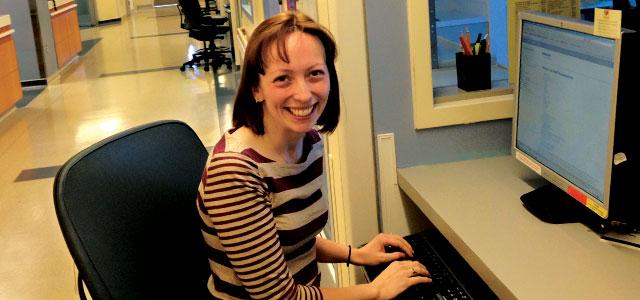
Jennifer Baird, doctoral candidate in the Department of Family Health Care Nursing
Commentary: A Call to Improve and Expand Pediatric Palliative Care
Note from UCSF School of Nursing Associate Dean for Research Kathryn Lee: This piece is the first in a series by doctoral students who have received grants from the National Institute of Nursing Research, a division of the National Institutes of Health (NIH). The prestigious funding helps UCSF School of Nursing maintain its high NIH ranking for funded research, and allows doctoral students to worry less about the financial strains of their education and research training. But the NIH stipend is the same amount for students nationwide, regardless of where they live – San Francisco is among the most expensive areas in the US – and the National Research Service Award (NRSA) grant covers only part of their tuition. For most, therefore, doctoral training often requires some sacrifice and a sincere passion for and dedication to their course of study. On behalf of all the faculty and alumni, we thank these students.
There are children in this country who suffer from complex, chronic and ultimately life-threatening conditions that necessitate frequent and prolonged contact with the pediatric health care system.
These children and their families can benefit from the incorporation of palliative care into the existing treatment-focused plan of care. Palliative care provides services that are aimed at optimizing quality of life, providing excellent symptom management and guiding families through complex decisionmaking processes over the trajectory of a child’s illness. Yet too often, these families do not have the option of palliative care services, and even when they are available, the families don’t optimally use such services. The question is why?
Perhaps it is because even though not all palliative care is end-of-life care, it remains closely associated with it, causing reluctance on the part of both health care providers and families to use such services. Another reason could be the challenges of establishing trusting, long-term relationships between families and providers. Yet another likely reason is the challenge of communication during critical periods in the child’s illness trajectory.
In fact, families report widely varying experiences in interactions with health care providers [1], and there is a need to better understand how communication and relationship building with these families is best achieved and how pediatric health care providers can optimize the care of these medically fragile children and their families.
That is the focus of my dissertation research. I am collecting and analyzing both observation and interview data to understand the ways in which parents and health care providers interact and the context in which care is delivered to children in the pediatric intensive care unit (PICU). I observe parents of children who consent to participate in the study as they interact with health care providers at key times over the course of a week. The parents also participate in an in-depth interview that explores their experiences with communication and relationship building in the PICU and asks them to identify the critical characteristics of the best pediatric health care providers.
At the same time, I interview health care providers whom participating parents or colleagues have identified as among the best, in an effort to understand how these providers approach communication and relationship building with children and their families. It is my hope that this research will reveal some of the key characteristics and best practices of these excellent clinicians, providing material that can be taught to current and future pediatric providers. I also hope to identify some of the contextual factors that either help or hinder relationship development in the PICU. This may lead to rethinking some of the existing systems of care if we are to provide the best possible care for these children and their families.
I am passionate about my work – it is hard not to be when you talk with these families and listen to them share their stories – which is why I am so grateful that my research continues to receive funding support that makes it possible. I have received grants from the UCSF School of Nursing’s Graduate Dean’s Health Sciences Fellowship and, since 2010, from a National Research Service Award (NRSA) funded by the National Institute of Nursing Research. The NRSA funding provides both tuition support and a monthly stipend, affording me the financial stability necessary to devote my efforts to full-time doctoral study. In addition, it has helped me to make connections in the field of palliative care research, opening doors to new ideas and new opportunities.
My work and the entire field of pediatric palliative care is only one piece of a larger palliative care effort – one that is often lost in the discussions.
But I believe the human impact on these families of building our understanding and doing this work better is incalculable. I am deeply hopeful that our efforts can continue.
Jennifer Baird is a doctoral candidate in the Department of Family Health Care Nursing and has clinical experience in both pediatric intensive care and pediatric oncology nursing. Her academic advisor and dissertation chair is Professor Emerita Betty Davies.
Reference
-
Davies B, Baird J, Gudmundsdottir M. Moving family centered care forward: Bereaved fathers’ perspectives. J Hosp Palliat Nurs. In press.



